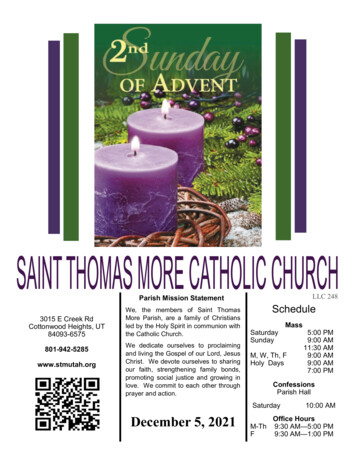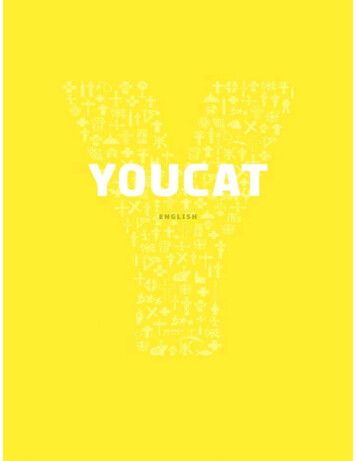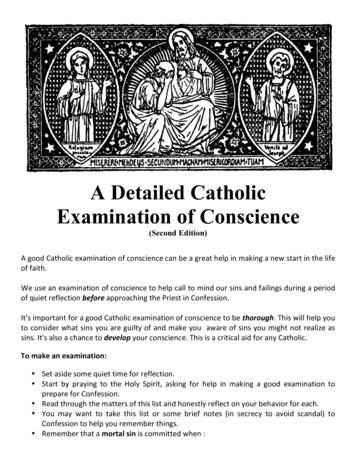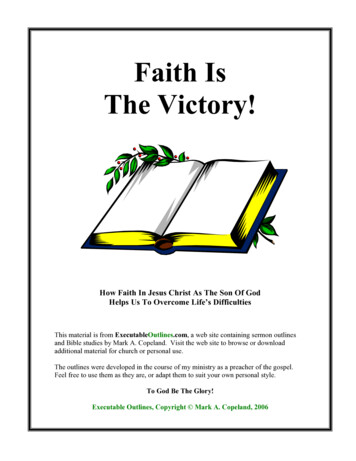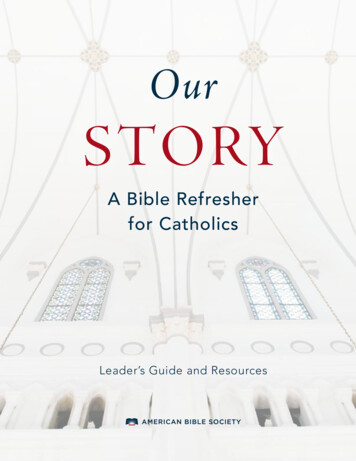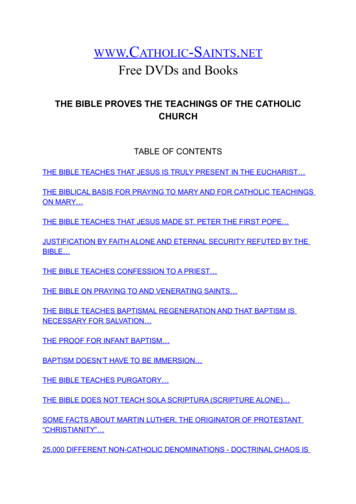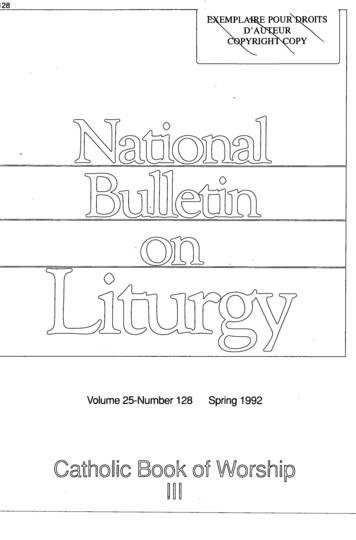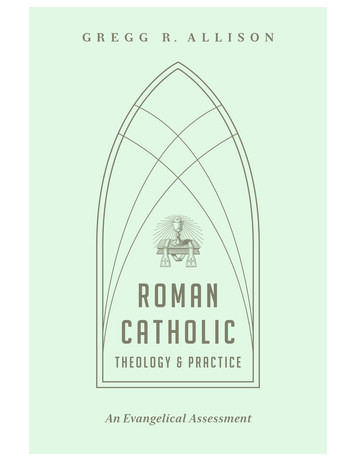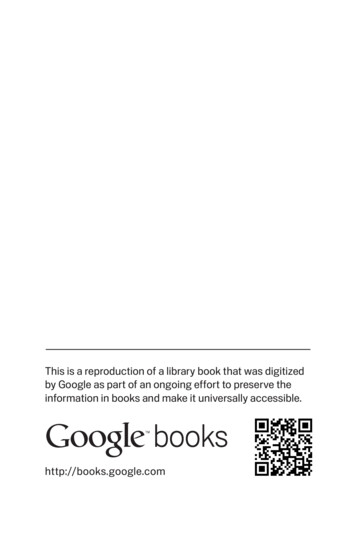
Transcription
This is a reproduction of a library book that was digitizedby Google as part of an ongoing effort to preserve theinformation in books and make it universally accessible.http://books.google.com
A“!
THERULECATHOLIC FAITH.
THERULECATHOLIC FAITH.
THERULEOFCATHOLIC FAITH;on, mafirimiplzs am: inortvimsOF THECAT HOLIC C BURCH,mscmmmmsu FROM THE OPINIONS OF THE sermons,AND FROMPOPULAR ERRORS AND MIS-STATEMENTS.TRANSLATED BY THEREV. J. WATERWORTH, M. A. /BIRMINGHAM :Printed and Published by R. P Stone, 5, Cherry Street,HOOKER, AND KEATING AND BRO‘1'N, LONDON;ROCKLIFFE AND DUCKWORTH, LIVERPOOL;WILLIAMS, CHELTENHAM ; SCULLY, DUBLIN; LYNCH, MANCHESTER; AND BRIDGEN,WOLVERHAMPTON;AND SOLD BY ALL OTHER BOOKSELLERS1833.* "' SRYumvmmmy OF CALIFORNIADAVIS
40v.I.rJ.‘Ia.l.r\lIA1.u
TRANSLATOR’S PREFACE.THE authority of the following treatise of Veron iswell-known, and universally acknowledged. TheTranslation is from the Latin edition of the work,which is much more complete and satisfactory, thanthe original French, as it first came from the pen ofthe Author. Of the latter, aTranslation has alreadyappeared in Our language, printed at Paris, in 1660,with only the initials of the Translator’s name, which,I have reason to believe, was Edward Sheldon.Butthere is such a dissimilarity between the two works,that they may almost be considered as two distinctpublications. The edition, which I have followed,is that which Hooke has appended to his Treatise onthe Church. The object of the work is to draw a distinct linebetween the doctrines of the Catholic Church, andthe opinions advanced by Catholic Theologians, onthe erroneous tenets ascribed to us by writers of 0ther persuasions. This the Author executes in amasterly manner. His plan is simple, but must,]think, prove highly satisfactory to any one, who sincerely wishes to know the real tenets of our Church.If this Translation tend in any degree to weaken,or remove prejudice, or to correct mis-statements,—
ii.much, if not the whole of the merit is due to LordDormer, without whose assistance, this Translationwould, probably, never have seen the light. lamaware, that, in a work of this kind, which is repletewith quotations from the writings of the schoolmen,which it demands no ordinary study to comprehend,many errors.or inaccuracies may have crept into theTranslation, I shall, therefore, deem it a favor tohave them fairly stated.
CONTENTS.CHAP. I.Catholic Rule of Faith.Explanation of the foregoing Rule .Consequences to be drawn from the above Rule . .,.,Other Doctrines not articles of Catholic Faith, because not revealed, or not proposed by the Church, or because both these conditions are wanting11CHAP. 11. 'Articles of Faith, on particular points of controversy, distinguished from Doc1 . .trines not taught by the Catholic Church.On the merit ofgood works—grace—-and eternal glory. .On JustificationOn Satisfaction . .On Indulgences.,,.On Purgatory, and sufi‘rages for the dead.On the Invocation of the Saints.On the Obligation of Human Laws, as binding the conscience.On the Judge of Controversies.36394966.-.On Images.On the relics of the Saints---and of the respect to be shewn them . .On the respect and honor due to the SaintsOn the presence of Jesus Christ in the Holy Eucharist.On Transuhstantistion.On the adoration of the Eucharist . .On the Sacrifice of the Mass . .u.On the Pope---his primacy, and authorit.28.,6981.939697. . 106.1 14. . 124.132142
.t.b ,. r,rlIvI‘\.1sA U-i“),.Iou.-fl.IA.‘JnIv\
VTHE.CATHOLICRULE OF FAITH.CHAP. I.§ 1.RULE or FAITH.That,and that only, is an Article of Catholic Faith, whichhas been revealed in the word of God, and proposed, by theCatholic Church, to all her children, as necessary to be believenl with divine faith. Whether a doctrine be proposed bya General Council, and confirmed by its definitive decree ; orrest on the universal agreement of the faithful, its authorityis the same.The above rule comprises two parts; the first requiringthat a doctrine, to be received as an Article of Faith, be revealed by Almighty God,-——f0r, Faith, says St. Paul, (Rom.x. 17) cometh by hearing, and hearing by the word of Christ;—-and the second, that it be taught by the Church, either inher General Councils, by an express and definitive decree ; orpractically confirmed by the unanimous assent of the pastorsof the Church, and the faithful., This, in fact, is clearly implied by the words “ CatholicFaith : ”-—-for, by divinefaith, is understood, the belief of anydoctrine on account of the divine authority that has revealedit: since every act of divine faith resolves itself, in the lastanalysis, into the authority and veracity of God.But thedoctrines of Christianity are proposed to our belief, eitherby those whom Christ commissioned to that office, the pastors of the church assembled in a General Council, or arereceived in virtue of the manifest agreement of the wholebody of the faithful. There can be no obligation, at leastfor the faithful as a body, to believe any doctrine that is notbased on this evidence, and proposed in this manner.B
2To prevent being misunderstood, I shall call doctrines ofthis class, articles ot Catholic Faith. I substitute the wordCatholic for the more usual 'term divine faith, because manywriters have applied the latter to debatable doctrines, todoctrines which someTheologians assert,and others deny arenecessary to be believed. The very existence ofsuch a dispute,shews, that even they who most strenuously contend, thatthe doctrines in question are to be believed, on the authorityof God, do not use the phrase in its strict sense ; since thosewho refuse to receive them as articles of faith, are not thereby considered as Heretics, deprived of the sacraments, orseparated from the communion of the church. It is theintention of the present pages to enquire, what doctrinesare articles of Catholic Faith, strictly so called; to confinethe queston to that Faith of which St. Paul says, with theheart, we believe unto justice; but with the mouth, confes—sion is made unto salvation—(Rom. x. 10.)I shall treatin a word, of that faith, the profession of which constitutesus members of the one fold, and is required from all whoabandon their errors, which alone is professed by the churchin her creeds, and must be subscribed alike by the Catholic,and the convert to Catholicity.This is the faith whichwith the heart we believe, and with the mouth confess ,- fromwhich are excluded all controverted questions, leaving theseto be defended, or impugned by Theologians, and the schools.The above rule and principles are laid down, and actedupon by all our councils, by the fathers of the church,and by the whole body of Theologians. Accordingly, thoseonly have been, and are still considered Heretics, whohave chosen to hold opinions, on points of this vital charlie-'ter, opposed to the belief clearly embraced by the agreementof the Universal Church, or the decrees ‘of her General Counoils. Such persons condemn themselves by preferring theirown private opinion and judgment, to that of the UniversalChurch.'5
3§2.‘EXPLANATION OF THE FOREGOING RULEFor any doctrine to be an article of Catholic Faith, twothings are oonjointly necessary :-—first, that the doctrine berevealed by Almighty God, by the mouth of his prophetsof apostles, or contained in the inspired writings that formthe canon of scripture ; and, secondly, that it be proposed tothe belief of the faithful by the church. A doctrine investedwith these two conditions must be believed with divine, anCatholic faith.But it no longer belongs to this heavenlydeposit, if either of these conditions fail ;—namely, if it havenot been revealed, or not been propounded by the church.The second condition, however, presupposes the first ;"—-7for. as Christ promised his church the assistance of , hisHoly Spirit to teach her, and lead her into all truth, it is impossible,—unless, as they cannot, these promises fail,-—that thisheavenly guided church can ever propose any thing as revealed, which has really not been so. However, a doctrine,although actually revealed by the Almighty, and contained,but in an obscure manner, in the holy scriptures, may, asyet, not have been proprised by the church. ' In this case,though semething. has been revealed, still, we require aninterpreter to explain the precise meaning of the revelationjand, as the church has not hitherto declared the sense ofthe inspired words, or unfolded her stores of tradition, n0thing can be said to be positively defined on the subject.Various and conflicting opinions may be advanced ; butuntil the church has spoken, none of these opinions have anyclaim to, be considered as a part of Catholic faith.It isupon this principle that fresh decrees on doctrinal points,have been made by our General Councils, and received bytheUniversal Church .: -for instance, the Council of Nicedefined that baptism, although administered by a heretic, oraperson-not a member of the true church, was valid, andought not to be repeated. On this controversy, St. Austinobserves ;* that as “ this question appeared doubtful to thebishops of the last century, and opposite opinions were main* S. Aug. Lib. ]. contra Crescen. cap. 32. Tom. 7, p. 168, col.
4tained ; though without causing any breach of unity, it wasresolved (at the Council of Nice, can. 8) that our presentpractice should alone be followed, throughout the CatholicChurch.” '§ 3.CONSEQUENCES TO BE DRAWN FROM THE ABOVE RULE. ' '1. As nothing is an article of Catholic Faith, which hasnot been revealed, and communicated to us by the prophets,0r apostles, or canonical writers,it follows that no revelationmade to any saint, since the time of the apostles, can be anarticle of our faith, though ascribed to an Ambrose, or aCyprian, or to any other servant of God however holy, or:however near to the apostolic age, or however modern.Many revelations are, indeed, recorded in the lives of thesaints, who are honoured by the church ; as in those of SaintCatharine of Sienna, St. Bridget, 8w. ; and some have evenreCeived the sanction of General Councils ;* but, respectableas is such an authority, these visions, and spiritual communications do not, on that account, challenge our belief asarticles of faith.- And the reason is, that these revelationswere not made, either to the prophets, or apostles, or canenical writers. The faith, consequently, with which they canbe received is merely human, since we acknowledge no di—‘vine authority in the writers that relate them.Our beliefin these revelations, is, therefore, weak or firm, doubtful orcertain, according to the weight ofevidence in their favor,—proportioned, in a word, to the credibility of the vouchers;This is frequently low indeed, and, by examining the circumstances that are said to have accompanied these revela?tions, time, these revelations are often found deserving of little or no credit. Yet, surely, if we believe profane historians,such as Suetonius, Dionysius of Halicarnassus, 8tc., soundcriticism requires us to yield an equal, or rather a firmerassent, to the relations of writers of greater weight, and authority.2. No doctrine, delivered since the time of the apostles,can be an article of our Faith, though even miracles have* Vid. second Council of Nice, Labb. Tom. 7, pp. 266, 267, &c.
5been performed to confirm it ; nor is it an article ofour Faiththat any of these miracles are really genuine. This is true,however respectable may be the authors that record them.Thus, though many miracles are related by St. Austin)“ St.Gregory, and other writers of equal authority, as havingbeen actually performed befOre their own eyes; and thoughothers are reported in the Bulls of Canonization publishedby the Bishop of Rome; whilst some are not only related,but are declared authentic by General Councils,—-as in theSecond Council of Nice; still they do not form any part ofCatholic Faith. And this for the reasons assigned in. thefirst corollary ;—these miracles were not performed, nor related by prophets 'or-apostles, and, consequently they cannotform an article of Catholic Faith, nor can any such articlehe built upon them.-, : -The lives of the saints are, indeed, full "of miraculousrelations, some evidently false, and others deserving of littlecredit. We have many instances of the first kind, in the liveswritten by Jacobus a Voragz'ne, and Metaphrast, especially intheir accounts of, St. George, St. Ursula, 81.0. Bellarmin, and Baroniusgt both make the same observation. Still, afterall proper deductions have been made, we shall find, if . weapply to them the ordinary rules of criticism, that, almostall, or, at least, the far greater part of the miracles ascribed totheIsaints must be pronounced genuine. For if,"as has beenalready observed, it would be considered rash, and foolishlysceptical to refuse to believe the accounts left us by SuetoHillS,8LC. and to deny that. the battles, which he describes,were ever fought, or that his facts are true; surely it wouldbe an equal, it-Znot a greater, act of folly, to reject, at once,‘as falseland ridiculous, all the miracles recorded by writersof the most acknowledged veracity and greatest weight,—some of whom, and, amongst these, St. Austin, declare, thatthey were eye-witnesses to many of the miracles, which theyrelate.But, of course, we believe these miracles with a,merely human faith, nor do we pretend to rest our belief* s. Aug. De civitate Dei Lib. 22, cap. 8, p. 296. Toni. 5.1' Bellarm. de Scriptor. Eccles. in Metaphr. pag. 266.t Baron. in Martyrol; ad eorum festa.
6in any revealed truth upon them, 'nor 'is any doctrine of Catholic Faith believed on their authority. It cannot, how;ever, be denied, that many doctrines have unquestionablybeen confirmed by themf; and they may thus, in same, thoughin a very modified sense, he said to bring with them a revelation from heaven. St. Paul (Epis. Hebr. ii. 3, 4) argues onthis principle, “ How shall We escape,” says he, “if we neg—lect so great salvation? Which having begun to be declaredby the Lord, was confirmed unto us, by them that heard him.God alsobearing them witness by signs, and wonders, anddivers miracles, and distributions of the Holy Ghost, acCOr-‘ding to his own will.” And St. Mark also, (xvi. 20) “ Butthey, going forth, preached everywhere : the Lord workingwithal, and confirming the word with signs that followed.”In this sense a miracle may be said to be the voice and wordof God; but, it is impossible for God to lie, (Hebr. vi. 18') inwhatever manner he is pleased to communicate his will 'to‘man. So that the evidence in favour of a doctrine confirmed by miracles, subsequently to the time of the apostles, isproportioned to' the degree of credibility due to the evidence;on which those miracles rest. This, as usual, is eitceedinglyvarious ;-at One time amounting to certainty, at another toprobability, and, sometimes, not even to this; according tothe character of the relators, and their means of information.It is deserving of being again noticed, that some of these writers were themselves eye-witnesses,—and witnesses of noordinary character,—-as an Austin, a Gregory, 8w. whilstsome miracles are also related by them on the testimony ofothers. To illustrate what has been said by an example. Itis an article of Catholic Faith, that the relics of the saintsare deserving of respect. The truth of this doctrine is mostpowerfully confirmed by the undeniable miracles related bySt. Austin, * as having been performed by the relics of St.Stephen, to which he himself was an eye-witness ; those recorded by him and St. Gregory, as having been related tothem by others, are of less force, but still furnish a probableargument ; whilst, as many of the miracles related by Metaphrast, and De Voragine are deserving fof little credit, they. .*s. Aug. 1. c.
7furnish little or no evidence incontirmation of any doctrine.Baronius“ passes the following just censure on these twolast writers. “ We have the, acts of St. George edited byMetaphrast, and I am far from approving or receiving thelegend about Athanasius, the magician.I have also lookedinto the legends of the saints by Jacobus de Yoragine, andfind much in them to correct.”Bellarmini' makes a Similar ,remark, atleast on Metaphrast. “ Metaphrast has left usthe livesof many saints, which hehas disfigured with numer0118 fictions, and stories drawn purely from his own fancy.He relates numerous miracles, and those, too, of a most ex—traordinary kind, as having happened at the destruction ofPagan temples and idols, of which we find not one word inany old writer,’? But, even granting that the miracles areproved to be clearly genuine, no article of faith can begrounded on them, since they were not performed, nor is theaccountof them lranamz'ltedto us, by the inspired prophets andapostles. ,Moreover they are not, generally at least, proposedand received by the Universal Church, to which alone Christpromised immunity from error. Accordingly, our belief inthem is purely human, and proportioned to the credibilityandcharacter of the writers, who record them, who were all ffllelible men. This belief differs widely from that, which we.yield to artides of Catholic Faith, and of which alone weare here treating.‘aBut what are we to call the assent yielded. to a doctrine.en the authority of theSe private revelations, as contradistingiiished from those made. to the prophets and apostles,and contained in the sacred writings? - Is it merely human,or may it not he divine, in as much as it seems to be elicited,and to rest on the authority of divine revelation, not indeedconfirmed, by thewritten or unwritten word of God, no;- autheritatively proposed by the Universal Church ;- but, cei-ti.fied by human testimony, and. the. relation of ,fallible men ’5.This is a purely problematical question, and as such is avery different thing from the articles of our , faith, which arenow our only concern. But, if called on for an opinion, I* Baronius in Martyr. 23, Aprilis. pag. 171. col. 1.'t Bellarm. de Scriptor, Eocles. none 850. p.
8should say, that very probably such a belief is not divine,but purely human; since'it rests on, and resolves itself into,the purely human authority of a certain number of falliblevwriters. The whole evidence being purely human, the assentyielded does not even amount to what is called TheologicalFaith, and, consequently, is very far indeed from being a di. vine or Catholic Faith.3. No doctrine is an article 0f Catholic Faith, which isgrounded on texts of scripture, which have been interpretedin various senses by the holy fathers, or, are still Ilifl'erentlyexplained by our best, and most learned modern Theologians.For, in this case, both the elements which constitute theCatholic Rule of Faith, are wanting. First, it is not clearthat the doctrine in question has been revealed; nor secondly,can any interpretation of the contested texts be said to beapproved of by.-th e Universal Church; as is evident fromthe very varietyof explanations supposed to exist.v How?ever, although it be true, that when, difi'erent opinions existin the church as to the precise doctrine to be drawnyfromcertain passages-of scripture, no interpretation ofthese passages can be called Catholic ; still, it must be. observed,that when the holy fathers, in their explanations of thesacred text, agree in deducing, and teaching'one and the samedoctrine, though from difl'erent passages of scripture, theirunanimous consent on this point of doctrine, must not onlybe considered as expressive of the belief of the churchpbutalso, as having its foundation ' in the revealed word ofGod, though not grounded on this or that particular passage.4. We do not admit as an article quatholic Faith, anyconsequence, however certain, or however logically deducedfrom premises, one of which is offaith, and the other clearby the mere-light of reason.There are two insuperable objections against any doctrine of thischaracterbeing classedamong our articlesof faith.The first is, that it has not beenrevealed, for, “faith,” says St. Paul, “ cometh by hearing :and hearing, bythe word (if Christ.”—(Rom. x. 17) but deductions, however clear they may seem, .fnoni scripturaltruths; are not mentioned in the sacred writings as a partof the word of God. But, as every ‘such consequence iscontained virtually in the premises, the-deductions, from
9scriptural propositions, of which we are speaking, thoughthey cannot be considered as formal, or express articles ofCatholic belief, virtually, at least, form a part of that sacreddeposit.In a word, the principle only is an artiCle of faith,and from it the mind deduces, as a necessary and clear consequence, a doctrine, which it receives, not indeed with adivine, but with a firm and unhesitating faith. The consequence drawn may be as evident and certain as any doctrinecan possibly be supposed to be, still, much that is merelyhuman goes to its formation, both in the necessary train ofargument,—which is often mixed with something purely philosophical,--and in the comparison and reunion of the ideascontained in the premises, without which, it is obvious, n0conclusion can be drawn.So that, considered as a whole,the process is far from being supernatural, and, consequently, the doctrine elicited can, by no means, be called divine.In the schools, if the premises be both undeniable, a consequence deduced from them is called a theological couolusion ,if one or both of them, as is generally the case, be doubtful,it is called a problematical opinion ,- but, if one of the pre—mises, or the form of argumentation be false and sophistica], the deduction is, naturally, called false. Most of thescholastic opinions, which have, so long, divided and torturedthe schoolmen, belong to this last class. It may be as well tonotice, that there is a diversity of opinion both among Catholic and Protestant writers, on the question, whether theological conclusions from scriptural propositions are articlesof faith. Catholics, as well as Protestants, assert that theyare; others, of both parties, deny it as warmly. Vego andMelchior Canus, among Catholic writers, support the affirmative, but, as even Daiilé grants} many theologians of thesame faith defend the negative of the question.Some take amiddle course, and distinguish between deductions from twoscriptural premises,—and these they assert to be of faith,—and conclusions drawn from two premises, one of which only is a scriptural proposition, and the other self-evident, andthese, according to these writers, are not of faith. Vasqueztagrees with none of the above opinions, and proposes another* Daillé in Fid. fund. part. i. p. 28.0fVasquez, l p. d. 12. a. 8. c. 2.
10of his own. According to him, our assent to a theologicalconclusion considered as resulting, by the common laws ofargument, from premises, one of which is revealed, and theother self-evident, is not an act of divine faith; but, inasmuchas a conclusion, virtually divine, is clearly contained in suchpremises, though this is discovered, or rather proposed to theunderstanding by ratio-cination, our belief may be said to bean act of divine faith. This variety of opinion shews clearlythat,amongstCatholicsat least,is, at most,only aprobablelopinionthatdeductionsfromitarticlesof faith,arealsooffaith.All are, consequently, agreed that they are not articles of Catholic faith; and that no one, therefore, would bea Heretic, who should choose to deny that they form a part ofthe deposit of faith. To assert the contrary, would be toexpose oneself to the charge of dangerous and presumptuous innovations in faith ;—we should ourselves incur theguilt of breaching new doctrines; and by the very fact ofcondemning others, be deserving of the strongest condemnation, and the severest censures of the Church. It must, then,be laid down as a certain and undeniable position, that theological conclusions are not articles of Catholicfaith. I havesaid that a similar difference of opinion is found amongstProtestant writers.Osiander, Chemniz, and, in fact, a' great majority of the ablest Lutheran divines, do not receivethem as articles of faith. Even Vedel * acknowledges this,though himself a strenuous supporter of the contrary opi—nion. His whole work, in fact, goes upon this principle.He is followed, or rather copied, by Daillé, and a few otherCalvinists, although, in general, the Dissenting Churches.agree with the Lutherans.There is not a word- on the sub-ject in' the Calvinistic confession of faith, so that the opinion'of these writers cannot be considered as that of their churchMoreover, as they consider the Lutherans, who differ fromthem on this point, as brothers in faith, and the cause of re-‘formation, I cannot see clearly with what consistency thesewriters could lay this down as 'a fundamental principle of»controversy: Surely the Calvinists, who adopt this princi-'ple, and yet act asI have'stated, cannot possibly expect'* Vedel. Rationale Theologicum.
llthat much security can be felt by their readers in the truthof doctrines built on so insecure a basis.cThere is, also, a second defect, which alone would sutiiceto hinder the opinion, that theological conclusions are articles of faith, from ever being considered, by Catholics atleast, as a necessary part of Catholic belief.This opinionhas never been proposed to the belief of the UniversalChurch. This is granted on all hands :——as it is neitherfound in clear and express words in Scripture; nor has itbeen taught-by any General Council. It is, therefore, aquestion open to debate; since, so long as a doctrine has,not been propounded by a competent authority, no one isbound to receive it as divinely revealed. And, as far as other dissenting churches are concerned, although some oftheir writers have chosen to call it a fundamental and essential doctrine, there is no public, or authoritative decision, inany of their confessions of faith, to authorise, or. give weightto thistheirconclusion,opinions. that,'this\Ve are justified,'atall events,ofincomingtoopinion is novarticleCatholic.faith.-- .§ 4.' . 1.Other doctrines not articles of Catholic faith, because norevealed, or not proposed by the Church, or because boththese conditions are wanting.:1. N0 doctrine is to be considered an article of Catholicfaith, on the authority of Gratian’s Decretal .' that is to say,no opinion is to be received as of faith, merely because it isfound in that Decretal. This observation deserves particu-;lar attention, as Du Moulin, and other writers of the same.stamp, have had the efi'rontery to assert, that whatever iscontained in that Decretal is an article of our Faith. Theirobject was manifestly, merely to find something fresh to condemo in the Catholic Church. But, surely, one religious isnot the Universal Church! Nor did Gregory XiII.,,or anyvother Pope, much less a General Council, in approving ofthis Decretal, ever declare that its contents were to be received as articles of Catholic faith.So far from this beingthe case, it is, really, no very difficult matter to detect mistakes in it of no small importance, such as false quotations,
12errors in chronology, 8w. Almost at the outset of his work,we find him‘quoting from St. Isidore's “ Books on Etymology,” SO little connexion has the matter before him with articles of faith. We also meet, almost in the same place, withthese titles to his sections :— What is civil law—what military,-—and what is meant by the tribunitial laws .7 ” Whathas this to do with articles of faith?2. No Decretals of the Roman Pontifi's, which form thebody of Canon Law ;—-ae the Sir Books of Decretals, theClementines, Extravagantes, (Sec ;——no Balls issued, more recently than these Decretals, by the successors of St. Peter,are of suflicient authority to prove any doctrine an article ofCatholic Faith. No doctrine is of faith because it happensto have been taught by the Pope in one of the above mentioned works. The reason is clear. The Pope, in whatevercharacter, or however solemnly he may give his opinion, evenin scholastic phraseology, ex cathedra, is not the universalchurch, and, cnsequen'tly, whatever may be his private opinion, and however declared, such opinion is not, on that account, propounded by the Catholic Church as an article ofher belief.And, observe, that this is so clearly acknowledged by all theologians, that any one that should presume toadvance a contrary opinion, would be an innovator, and expose himself to the censures of the Church, as a broacher ofnew doctrine. This may be shewn even from Bellarmin,where he cites the three opinions that have been advancedby Catholic writers, on the authority of doctrinal decisionsemanating from the Pope. He says,* “ The first opinion is,that the Pope, even speaking as the successor of St. Peter,or as Pope, may teach heresy, when he takes upon himselfto define anything, without the concurrence of a GeneralCouncil; and even be an actual and formal heretic. This,it isasserted, has really happened. Gerson, Almain, and severalother French theologians have maintained this opinion,which was also defended by Alphonsus de Castro and PopeAdrian VI. All these writers placed the infallibility of theChurch, in matters of faith, not in the Pope, but in the Uni—* Bellarm. Lib. 4. de Pont. Rom. cap. 2. p. 209. Tom. I. Colon.Agrip. an. 1628.V
13versal Church, or rather, in a General Council.A secondopinion runs to the opposite extreme, and asserts, that thePope can, under no circumstances; be a heretic, nor publiclyadvance an heretical opinion, even, though alone and unadvised, he teach a particular doctrine. The third opiniontakes a middle course, and teaches that, whether the Popecan be a heretic or not, he cannot, at least, in any case,'propose an heretical opinion, and direct it to be received by theUniv
CATHOLIC RULEOFFAITH. CHAP. I. § 1. RULEor FAITH. That,andthat only, is anArticle ofCatholicFaith,which hasbeen revealed in the word of God, and proposed, bythe Catholic Church, to all her children, as necessary to be be lievenl withdivinefaith. Whetheradoctrinebeproposedb

